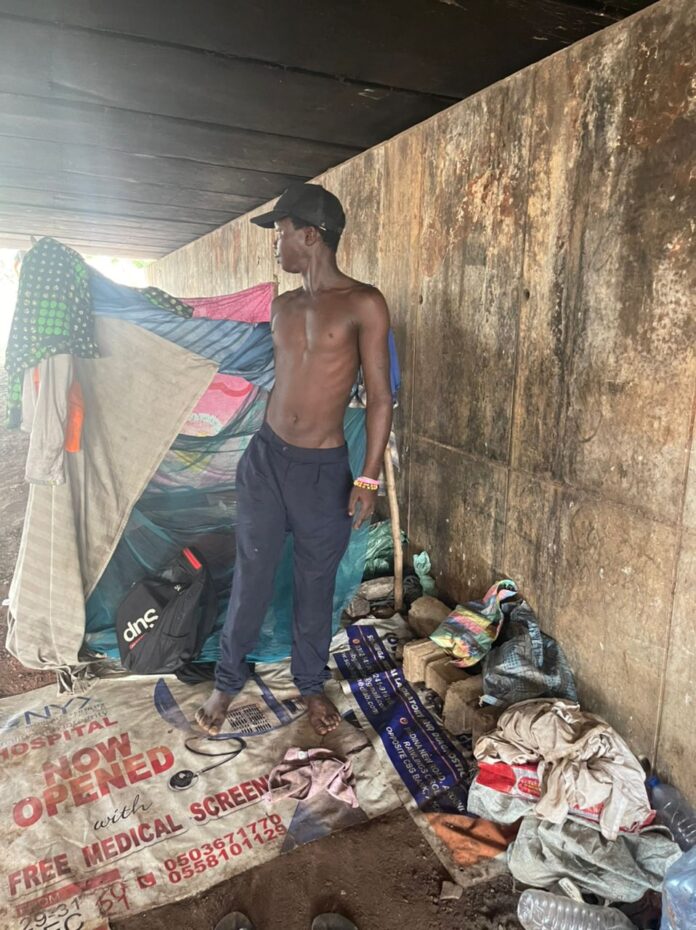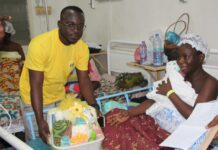
The Kwame Nkrumah circle in Ghana’s capital Accra serves as home for many street families.
Majority of them engage in all sorts of menial activities during the day, but when night falls, it becomes a case of desperation.
With a strong stench from the Odaw River, 43-year-old Heyford Bosompim is forced to sleep close to this major drain. He says his daily paltry income of GHC30 as a bus conductor cannot get him any decent place to rent.
Bosompim, whose ambition of becoming a commercial driver now remains a pipe dream, takes solace in drugs, which he admits has been his biggest downfall. He shared the harrowing story of survival at night, especially being at the mercy of the vagaries of the weather.
“I suffer mosquito bites all night”
STANDUP (This makeshift structure under the Odaw River houses Heyford and his four other friends. They’ll have to battle the stench and mosquito bites all night hoping that one day, they’ll have a better home.”
A drive through town at midnight by the news team revealed how a large number of people turn the frontage of shops into sleeping places, with others taking shelter in very obscure places. For those who sleep in front of shops, their sleeping times are determined by the shop owners and what time they decide to close for the day.
Many of the street families are compelled to pass the night huddled to each other with babies as young as three months old.
Julie Dzikunu a homeless mother of five “I came here when I was carrying my fifth child.
“I was sleeping her at night and trading in the day. I am her to make some money then occasionally I send it home.”
At 6:45 am, as many prepare for work amid the city’s hustle and bustle, 24 year old Akwasi Boafo is fast asleep.
An old tattered mosquito net and dirty clothes serving as sheets, are all he had to keep him cozy throughout the night.
Before setting out to town to make ends meet, he lights up some sticks to warm his leftover rice which he had to eat without any sauce.
Akwasi Boafo tells me he traveled from Assin Fosu in the Central Region to Accra six years ago for greener pastures.
He says living on the streets of Accra is synonymous to being put in a lion’s den, recalling how he lost his right eye during an altercation with a fellow street boy.
“A friend threw an orange at my eye and because I didn’t have money for medication, I lost sight in the ring eye”
A car knocked him down at night on his way to where he takes shelter, leaving him in pain even after seeking the help of a traditional healer 3 years ago. Akwasi survives in Accra by scavenging for used bottles and scraps, which he sells to scrap dealers and recycling companies.
Akwasi is not the only young man struggling on the streets ofAccra. On top of the Atomic junction bridge, we found another young man who had decided to live in this makeshift structure. He has to climb up pillars to get to where he sleeps.
Uncomfortable with the cameras capturing him, he yelled at the news team with threats.
24-year-old visually impaired mother of three, Felicia Azeloko, who appears heavily pregnant, tells me how her hopes of a better life in Accra have been dashed. She came all the way from Bolgatanga in the Upper East region of Ghana.
The harsh reality of city life has dealt her a big blow – unable to fend for her children without begging on the streets.
Her 11 year-old son Richmond Evans hopes to go back to school with his siblings, who have all now resorted to begging to survive, sometimes under life-threatening conditions.
In June 2015, when a flood and fire disaster which claimed almost two hundred lives – those who live and survive on the streets were said to be the most vulnerable.
According to the Borgen Project, out of the population of over 30 million, there are 100,000 people homeless on any given night. Clearly, the majority of these homeless persons have limited employment opportunities, a situation that could fuel insecurity according to experts.
Richard Dzikunu is a Development Expert. He finds the trend very problematic, calling for urgent pragmatic steps to stem it.
Some African countries like Kenya have created a Street Families Rehabilitation Trust Fund (SFRTF) to coordinate and develop capacity, mobilize resources to facilitate and monitor rehabilitative, re-integrative &preventive programmes for Street Families.
At inception, more than 6000 children and youth were removed from the streets and placed in rehabilitation centres across the country.
More than 1200 children have been registered and are receiving various services like counseling, referrals, recreation activities, nutritional support, re-integration and facilitation to access education and vocational training in Kenya through the fund, with more than 2000 other children rehabilitated and enrolled in various primary schools across Kenya.
In Ghana, the Ministry for Gender, Children and Social Protection in 2017 launched the ‘Operation Get Off the Street Now for Better Life’ project to address streetism but it has yielded very little or no results.
The lack of resources and homes for the upkeep of homeless and vulnerable children who have been picked from the streets is a major hurdle undermining the capacity of the various metropolitan, municipal and district assemblies (MMDAs) in Accra.
Experts believe when holistic measures are put in place to address the increasing rural-urban migration fueled by unemployment, many young people living on the streets like 24-year-old Akwasi Boafo, would have better prospects and will not become liabilities and sometimes threats to national security.
Source: Ghana/GHOneNews/Starrfm.com.gh/103.5FM/Godwin Asediba



